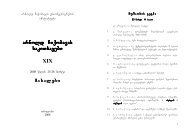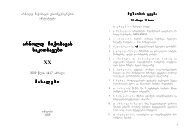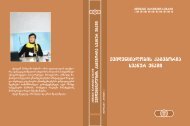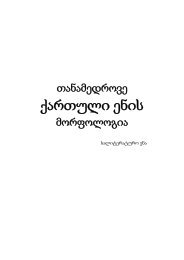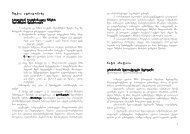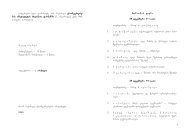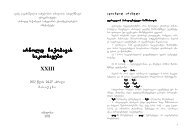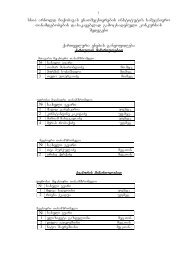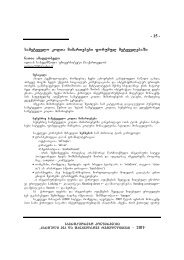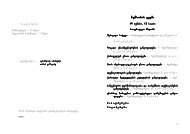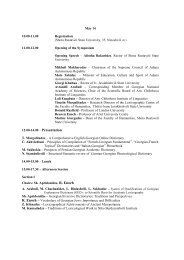5 r. a b a S i a (Tbilisi) bgeraTSesatyvisobis erTi rigisaTvis qarTvelur ...
5 r. a b a S i a (Tbilisi) bgeraTSesatyvisobis erTi rigisaTvis qarTvelur ...
5 r. a b a S i a (Tbilisi) bgeraTSesatyvisobis erTi rigisaTvis qarTvelur ...
Create successful ePaper yourself
Turn your PDF publications into a flip-book with our unique Google optimized e-Paper software.
A. V a g a p o v (Grozny)<br />
On Origin of Some Names of Animals in Chechen<br />
Buož ‘he-goat’ (Ing. buog, Bats. b'ok'). Origin from Pranakh. *bag (cf.<br />
Ch. pl. bežaloj < bažiloj), wich correlates to Kab. bžen ‘she-goat’, Adygh.<br />
bž’e ‘horn’, Dargva bek’, Lak bak’ ‘head, leader’ and PIE *bog- ‘with curved<br />
horns’ in OIc bokkr, OHG boc, OIr boc, Pers boz ‘buck’. Cf also Svan. pik’w<br />
‘castrated he-goat’ (< *bik’w < *bak’w). Related to Chech buoža ‘man’, pl.<br />
buožarij, buožaber ‘boy’, Tab baž ‘boy’, pl. bažar, Lith. buože ‘head, hump,<br />
bunch’, buožis ‘man with big head’.<br />
Buorš ‘stirk’ (Ing buorš, Bats borš, pl. baršuj). Related to Skrt. vrşa-<br />
‘bull, ox’, vrşan ‘male’, varşati ‘to rain’, Avest. varešna ‘male’, L *versеs<br />
‘wild boar’, Lith. veršis ‘calf’, Latv. versis ‘ox’. Originally barš ‘fecundating,<br />
impregnating’, cf Gen. baršan, pl. beršaloj < baršiloj, buoršalla ‘fecunation,<br />
impregnation’. Possibly related to Avar barši ‘maturity’, Cham. baršila ‘maturing’.<br />
Bula ‘bison’ – Dag. *bol’on / *bul’un ‘swine, hog’ (Avar bul’on, Andi<br />
bol’on, bul’uni), Adyg blane ‘courageous, energeting’, Kabar. blane ‘strong’,<br />
‘best’, ‘fallow-deer, doe’ – PIE *bul- ‘swell, big; ox’ (MHG bulle, OE bula,<br />
bull ‘ox’, ON boli, OHG boln ‘big’) – Turk *bolan ‘els, stag’. From Nostratic<br />
*bulun ‘big, strong animal’, related to Chech. b-ula n ‘strain, load (gun)’, Skrt<br />
bala ‘force’, balavant ‘strong’, bala-da ‘bull’.<br />
Saj ‘stag’ (Ing saj, Bats sag). Formed with suff. -g from Nakh. *sa ‘corner,<br />
horn’ and literally means ‘horned animal’, cf. semantically Lat. ceruus ‘deer’,<br />
Greek keras ‘horn’, kar ‘head’, Nakh *kar ‘head, horn’ > Chech. kur, pl.<br />
karraš. Related to Ch. sag // stag ‘man’, Iran *saka ‘fork, bifurcation, branch,<br />
horn’, Osset. sag ‘stag’.<br />
Sag // stag // tag ‘husband, man’ (Ing sag, Bats stak’), having parallels in<br />
Caucasian languages (Gunzib suk’u, Bezhit. suk’o, Tcez. žek’u, Khvarsh.<br />
žik’wa ‘man’, Lak ttukku ‘donkey’) and some other languages: Hurrit. taghe<br />
‘man, male’, OE secg ‘man’, Eng. stag.. Nakh. *sag ‘stag’ (> stag > tag).<br />
Su // stu // tu ‘ox’ (Ing ust, Bats pst’u). From Nakh *sa(r) // *sta(r) //<br />
*ta(r), related to PIE *(s)taru // *(s)taur- ‘ox, bull’ (Lat. taurus, Lith. tauras,<br />
O-Sl. turъ, ORus. тур, Alb. tarok, Gall. tarvos, OIr. tarb ‘ox’) and Semit.<br />
166



